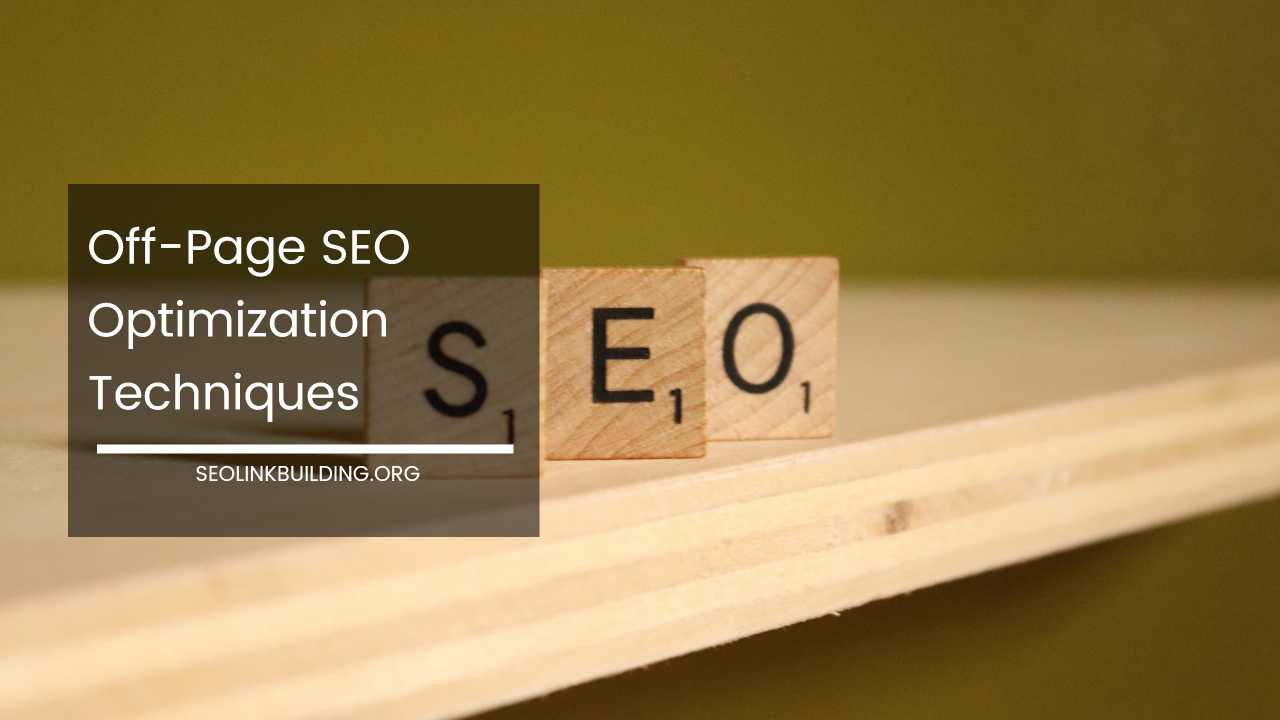Off-Page SEO Optimization Techniques

Off-Page SEO Optimization Techniques: Building Authority Beyond Your Website
In the ever-evolving landscape of search engine optimization (SEO), achieving top rankings on search engine results pages (SERPs) is paramount for attracting organic traffic and achieving your online goals.
On-page SEO focuses on optimizing elements within your website, while off-page SEO delves into strategies that influence your website’s authority and credibility in the eyes of search engines.
This comprehensive guide equips you with a deep understanding of off-page SEO techniques, empowering you to craft a well-rounded strategy that propels your website towards the top of search engine rankings.
Unveiling the Importance of Off-Page SEO
Search engines like Google consider a complex interplay of factors to determine a website’s ranking. While on-page elements like keyword optimization and website structure are crucial, off-page factors hold significant weight as well.
Here’s a deeper dive into why off-page SEO is vital for your success:
- Establishing Website Authority: Backlinks from high-quality, relevant websites act as endorsements for your site. The more backlinks you possess, the more authoritative your website appears to search engines, significantly boosting your ranking potential.
- Increased Brand Awareness: Off-page techniques like social media promotion and guest blogging expose your brand to a wider audience, leading to increased brand recognition and website traffic. This broader brand awareness translates to a larger pool of potential customers who are familiar with your offerings.
- Driving Targeted Traffic: Effective off-page strategies attract visitors genuinely interested in your content. Social media promotion, influencer marketing, and industry forum participation connect you with a targeted audience who is actively seeking information or solutions related to your niche. This targeted traffic is more likely to convert into leads or customers compared to generic traffic sources.
By implementing a robust off-page SEO strategy alongside your on-page efforts, you create a synergy that significantly improves your website’s search engine visibility and organic reach.
Top Off-Page SEO Techniques to Supercharge Your Website’s Ranking
Now that we’ve established the significance of off-page SEO, let’s explore some of the most effective techniques to incorporate into your strategy, along with advanced tactics to elevate your off-page game:
1. Link Building: The Cornerstone of Off-Page SEO (and Beyond)
Link building remains the cornerstone of off-page SEO. It involves acquiring high-quality backlinks from relevant websites. Here are some effective link-building strategies, along with some advanced tactics to take your link-building efforts to the next level:
- Create High-Quality, Evergreen Content: Content that is informative, engaging, and valuable to your target audience naturally attracts backlinks. However, consider creating “evergreen content” that remains relevant and valuable over time. This type of content will continue to attract backlinks for years to come, providing long-term SEO benefits.
- Guest Posting with a Strategic Twist: Guest posting on established websites in your niche is a classic link-building strategy. To elevate your guest posting approach, consider developing a “link-worthy asset” – an infographic, research paper, or data-driven study – that you can offer to potential guest blogging partners. This valuable asset increases the chances of securing backlinks within your guest post.
- Broken Link Building with Automation: Identify broken links on relevant websites using automated tools like Ahrefs or SEMrush. However, don’t just send a generic email suggesting your content as a replacement. Personalize your outreach by highlighting how your content specifically addresses the topic of the broken link and enhances the user experience.
- HARO (Help A Reporter Out): Journalists and bloggers are constantly seeking credible sources for their articles. HARO is a free service that connects journalists with industry experts. Sign up for HARO alerts relevant to your niche and provide insightful quotes or commentary for interview opportunities. This not only establishes you as a thought leader but may also lead to backlinks within the published article.
2. Content Marketing: The Fuel for Your Off-Page Strategy
Content marketing goes hand-in-hand with link building. By consistently creating valuable and informative content, you establish yourself as a thought leader in your industry.
This high-quality content is more likely to be shared and linked to by others, boosting your off-page SEO efforts.
Expand Your Content Arsenal:
Go beyond traditional blog posts and explore various content formats to cater to diverse audience preferences:
- Create In-Depth Guides and White Papers: Offer comprehensive resources that delve deep into industry topics, showcasing your expertise and providing valuable insights to your audience.
- Develop Engaging Videos and Podcasts: Video and audio content are powerful ways to connect with your audience on a deeper level. Create informative explainer videos or insightful interview podcasts to engage your viewers and listeners.
- Host Interactive Webinars: Webinars allow you to present valuable information to a targeted audience in real-time. Incorporate interactive elements like polls, Q&A sessions, and live chat to keep your audience engaged. Recordings of these webinars can be repurposed into blog posts or social media content, extending their reach and potential for backlinks.
3. Social Media Promotion: Leverage the Power of Social Sharing
Social media platforms are a goldmine for off-page SEO. Share your content on social media channels like Facebook, Twitter, and LinkedIn to increase its visibility and encourage social shares. However, to maximize your social media impact, consider these strategies:
- Tailor Content for Each Platform: Understand the unique characteristics of each social media platform and tailor your content accordingly. Utilize eye-catching visuals for platforms like Instagram and Pinterest, while crafting informative and engaging captions.
- Run Social Media Contests and Giveaways: Hosting contests and giveaways on social media is a fantastic way to generate excitement, increase brand awareness, and encourage social shares. Offer prizes relevant to your target audience and clearly outline the contest rules and requirements for participation.
- Engage in Social Listening: Social media platforms provide valuable insights into audience preferences and industry trends. Use social listening tools to track brand mentions, industry conversations, and trending topics. This allows you to create content that resonates with your audience and participate in relevant discussions, potentially attracting backlinks from industry influencers.
4. Online Reviews and Brand Advocacy:
Encourage customer reviews on platforms like Google My Business, Yelp, and industry-specific review sites. Positive reviews not only build trust with potential customers but also act as valuable off-page SEO signals. Additionally, monitor brand mentions online and engage in conversations where appropriate.
Take Online Reviews a Step Further:
- Develop a Review Acquisition Strategy: Don’t leave online reviews to chance. Create a system for proactively encouraging satisfied customers to leave positive reviews. This could involve sending personalized emails after a purchase or including a call to action on your website.
- Respond to All Reviews (Positive and Negative): Thank customers for positive reviews and acknowledge negative reviews by offering solutions and demonstrating your commitment to customer satisfaction. This proactive approach fosters trust and loyalty, potentially leading to positive brand advocacy online.
5. Forum Marketing: Become an Industry Authority
Participating in relevant online forums and communities allows you to connect with your target audience, answer their questions, and establish yourself as an expert. However, to maximize your forum marketing efforts, consider these tips:
- Provide Invaluable Insights: Don’t just offer generic responses or blatant self-promotion. Take the time to research topics thoroughly and provide well-informed, insightful answers that demonstrate your expertise.
- Build Relationships with Other Community Members: Engage in genuine conversations with other forum members. Offer helpful advice and participate in discussions beyond just promoting your brand. This fosters trust and strengthens your reputation within the community.
- Identify Link-Building Opportunities: While avoiding blatant self-promotion, there may be opportunities to share links to your high-quality content when it directly addresses a forum topic. This can be a natural way to acquire valuable backlinks.
6. Influencer Outreach: Partner with Industry Leaders
Partnering with influencers in your niche can significantly boost your off-page SEO efforts. Influencers have established audiences who trust their recommendations. Here are some ways to leverage influencer marketing for off-page SEO:
- Identify Relevant Influencers: Don’t just go after the biggest names in your industry. Focus on micro-influencers with engaged followings who resonate with your target audience.
- Develop Mutually Beneficial Partnerships: Don’t just bombard influencers with product pitches. Develop genuine connections and explore partnership opportunities that benefit both parties. This could involve product reviews, sponsored content creation, or co-hosting webinars.
- Track and Analyze Results: Measure the impact of your influencer marketing campaigns. Track metrics like website traffic, brand mentions, and social media engagement to assess the success of your partnerships and identify areas for improvement.
7. Public Relations and Brand Awareness:
Building strong relationships with journalists and bloggers can lead to positive media coverage and brand mentions. Issue press releases for newsworthy announcements, participate in industry events, and contribute to relevant publications to increase brand awareness and potentially attract backlinks.
Expand Your PR Strategy:
- Develop Newsworthy Content: Create content that is newsworthy and has the potential to be picked up by journalists. This could involve industry research reports, innovative product launches, or insightful commentary on current events within your niche.
- Pitch Stories to Journalists: Research journalists who cover your industry and identify topics that align with their interests. Craft compelling pitches that highlight the newsworthiness of your content and the value it offers to their readers.
- Monitor Brand Mentions and Respond Strategically: Use social listening tools to track brand mentions in news articles and online media. Respond promptly to positive mentions and address any negative press with transparency and professionalism. This proactive approach strengthens your brand reputation and fosters positive relationships with journalists.
8. Broken Link Building with a Focus on Quality
While broken link building remains a valuable technique, prioritize quality over quantity. Here’s how to refine your approach:
- Target High-Authority Websites: Focus on identifying broken links on websites with high domain authority (DA). Backlinks from these websites carry more weight with search engines compared to links from low-authority sites.
- Offer Relevant Replacements: Don’t just suggest your content as a generic replacement for any broken link. Analyze the broken link and ensure your content closely aligns with the topic and intent of the original page.
- Personalize Your Outreach: Craft personalized outreach emails that highlight the value your content offers as a replacement for the broken link. Demonstrate your understanding of the website’s content and target audience to increase the chances of securing a backlink.
9. Guest Blogging with Advanced Strategies
Guest blogging is a cornerstone off-page SEO technique, but here’s how to elevate your approach:
- Target Niche-Relevant Publications: Don’t just guest post on any website that accepts guest submissions. Focus on high-quality publications within your niche that attract a targeted audience genuinely interested in your content.
- Repurpose Existing Content Strategically: Instead of creating entirely new content for every guest post opportunity, consider repurposing existing high-performing content into guest blog posts. This saves time and ensures you’re sharing valuable content with a new audience.
- Track Guest Blogging Performance: Monitor the traffic and backlinks generated from your guest blog posts. Analyze which guest blogging placements deliver the most value and prioritize future opportunities with those publications.
10. Video Marketing and Off-Page SEO
Video content is a powerful tool for engagement and brand awareness. Here’s how to leverage video marketing for off-page SEO:
- Optimize Your Videos for Search: Optimize your video titles, descriptions, and tags with relevant keywords to improve search engine visibility.
- Promote Videos on Social Media Platforms: Share your videos on social media platforms like YouTube, Facebook, and Twitter to increase viewership and encourage social shares.
- Embed Videos on High-Traffic Websites: Look for opportunities to embed your videos on high-traffic websites relevant to your niche. This can be achieved through guest blogging partnerships or website collaborations.
11. Building Relationships with Industry Experts
Building relationships with industry experts can open doors to valuable off-page SEO opportunities. Here are some ways to connect with industry leaders:
- Attend Industry Events and Conferences: Participating in industry events and conferences allows you to network with potential collaborators and thought leaders.
- Engage on Social Media: Follow industry experts on social media and participate in relevant conversations. Offer insightful comments and share their valuable content to build rapport.
- Contribute to Industry Publications (Co-Authoring): Collaborate with industry experts on co-authored articles for industry publications. This leverages the expertise of both parties and expands your reach within the industry.
12. Local SEO for Brick-and- Mortar Businesses
If you operate a brick-and-mortar business, local SEO is crucial for attracting local customers. Here are some key strategies to consider:
- Claim and Optimize Your Google My Business Listing: Claim your Google My Business listing and ensure all your business information is accurate and up-to-date. Encourage positive customer reviews and respond to all feedback promptly.
- Build Citations Across Local Directories: List your business on relevant local directories and online business listings. Ensure consistency in your NAP (Name, Address, Phone Number) across all platforms.
- Run Targeted Local PPC (Pay-Per-Click) Campaigns: Consider running local PPC campaigns to target potential customers searching for products or services within your area.
Final Thoughts: Building a Sustainable Off-Page SEO Strategy
Off-page SEO is an ongoing process that requires consistent effort and a focus on quality over quantity. By implementing the strategies outlined above and tailoring them to your specific niche, you can build a sustainable off-page SEO strategy that drives organic traffic, boosts website authority, and propels your website towards the top of search engine rankings.
Here are some additional tips for ongoing success:
- Stay Up-to-Date with SEO Trends: The SEO landscape is constantly evolving. Stay informed about the latest algorithm updates and industry best practices to ensure your off-page SEO strategy remains effective.
- Measure and Analyze Results: Track the impact of your off-page SEO efforts. Use analytics tools to monitor website traffic, backlinks acquired, and keyword rankings. Analyze this data to identify what’s working and what areas require improvement.
- Embrace a White Hat Approach: Avoid black-hat SEO tactics like link buying or keyword stuffing. Focus on building genuine relationships, creating high-quality content, and earning backlinks organically. This ensures long-term SEO success and avoids potential penalties from search engines.
By following these guidelines and consistently refining your off-page SEO approach, you can establish your website as a trusted authority in your industry and achieve long-lasting success in the ever-competitive world of search engine optimization.
Bonus Tip: Off-Page SEO Tools to Enhance Your Strategy
Several valuable tools can streamline your off-page SEO efforts and provide valuable insights. Here are a few to consider:
- Ahrefs: Ahrefs offers a comprehensive suite of SEO tools, including backlink analysis, keyword research, and competitor analysis.
- SEMrush: SEMrush provides similar functionalities to Ahrefs, including link building tools, on-page SEO audits, and keyword research capabilities.
- Moz Link Explorer: Moz Link Explorer is a powerful tool for analyzing backlinks, identifying link-building opportunities, and tracking domain authority.
- BuzzSumo: BuzzSumo helps you discover trending content and identify potential influencer partners within your niche.
- Google Search Console: Google Search Console is a free tool from Google that provides valuable insights into your website’s search engine performance, including backlinks, keyword rankings, and mobile usability.
Remember, off-page SEO is a marathon, not a sprint. By implementing these strategies, consistently creating high-quality content, and nurturing relationships within your industry, you can establish a long-term off-page SEO strategy that drives sustainable success for your website.













